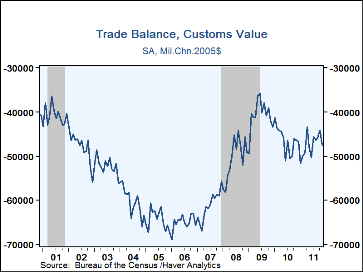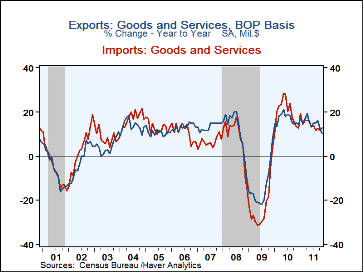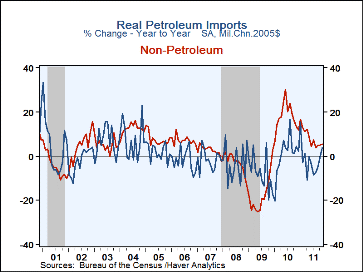 Global| Jan 13 2012
Global| Jan 13 2012U.S. Trade Deficit Is Deepest in Five Months
by:Tom Moeller
|in:Economy in Brief
Summary
The U.S. foreign trade deficit deepened during November for the first time in five months. The shortfall rose to $47.8B from a revised $43.3B in October, initially reported as $43.5B. Expectations had been for $44.7B according to [...]
 The U.S. foreign trade deficit deepened during November for the
first time in five months. The
shortfall rose to $47.8B from a revised $43.3B in October,
initially reported as $43.5B. Expectations had been for $44.7B
according to Action Economics. Exports declined 0.9% (+10.3% y/y)
while imports rose 1.3% (+12.7% y/y). In chained 2005 dollars, the
overall deficit in goods deepened to $47.5B; real exports fell 1.5%
(+6.1% y/y) while real imports increased 1.3% (4.9% y/y).
The U.S. foreign trade deficit deepened during November for the
first time in five months. The
shortfall rose to $47.8B from a revised $43.3B in October,
initially reported as $43.5B. Expectations had been for $44.7B
according to Action Economics. Exports declined 0.9% (+10.3% y/y)
while imports rose 1.3% (+12.7% y/y). In chained 2005 dollars, the
overall deficit in goods deepened to $47.5B; real exports fell 1.5%
(+6.1% y/y) while real imports increased 1.3% (4.9% y/y).
Overall exports slipped 0.9% led by a 1.2% decline (+11.2% y/y) in goods exports. Exports of industrial supplies & materials slumped 3.8% (+17.9% y/y) but nonauto consumer goods jumped 5.4% (4.8% y/y). Capital goods imports slipped 0.6% (+9.2% y/y) while exports of automotive vehicles fell 1.9% (+17.5% y/y). Services exports were roughly unchanged (8.1% y/y). Travel exports fell 2.2% (+8.1% y/y) as fewer individuals visited the U.S. and passenger fares also fell 2.2% (+16.1% y/y).
Total imports rose 1.3% in November as goods imports increased 1.9% (14.0% y/y). Imports of industrial supplies gained 4.5% (25.8% y/y) as oil prices rose but imports of nonauto consumer goods imports fell 1.6% (+4.1% y/y). Imports of capital goods inched up 0.3% (8.7% y/y) while auto imports rose 3.8% (15.0% y/y). Imports of services slipped 0.4% (6.1% y/y). Travel imports fell 1.6% (+3.8% y/y) as fewer U.S. citizens traveled abroad while passenger fares fell 0.6% (+6.9% y/y).
The value of November's petroleum imports jumped 9.3% (37.7% y/y with higher prices. In constant dollars, petroleum imports increased 5.8% and by 3.9% y/y. The cost of crude oil per barrel rose to $102.50, its highest level since September, 2008. In October, 2010, the average price hit a low $74.21. During November, the quantity of energy-related petroleum imports rose 4.1% y/y.
By country, the November goods trade deficit with mainland China lessened m/m to $26.9B. That was increased from $25.1B twelve months earlier. Imports from China increased 6.5% y/y to $36.8B while U.S. exports rose 5.1% y/y to $9.9B. With Japan, the deficit slipped to $6.2B as exports rose 16.7% y/y and imports rose 10.5% y/y. The deficit with the European Union deepened to $9.7B with a 4.8% y/y rise in exports to Europe and a 12.6% jump in imports.
The international trade data can be found in Haver's USECON database. Detailed figures are available in the USINT database. The expectations figures are from the Action Economics consensus survey, which is carried in the AS1REPNA
| Foreign Trade | Nov | Oct | Sep | Y/Y | 2010 | 2009 | 2008 |
|---|---|---|---|---|---|---|---|
| U.S. Trade Deficit | $47.8B | $43.3B | $44.2B | $38.8B (10/10) |
$500.0B | $381.3B | $698.3B |
| Exports-Goods & Services | $177.8 | $179.4B | $180.6B | $166.1B | $1,838B | $1,575.0B | $1,842.7B |
| % Change | -0.9 | -0.7 | 1.4 | 10.3 | 16.7 | -14.5 | 11.4 |
| Imports-Goods & Services | $225.6 | $222.6B | $224.8B | $200.0B | $2,333.8B | $1,956.3B | $2,541.0B |
| % Change | 1.3 | -1.0 | 0.6 | 12.7 | 19.5 | -23.0 | 8.1 |
| Petroleum | 9.3 | -5.5 | 1.1 | 37.7 | 32.5 | -44.0 | 37.0 |
| Nonpetroleum goods | 0.1 | -0.1 | 0.4 | 9.3 | 20.8 | -20.9 | 1.5 |
Tom Moeller
AuthorMore in Author Profile »Prior to joining Haver Analytics in 2000, Mr. Moeller worked as the Economist at Chancellor Capital Management from 1985 to 1999. There, he developed comprehensive economic forecasts and interpreted economic data for equity and fixed income portfolio managers. Also at Chancellor, Mr. Moeller worked as an equity analyst and was responsible for researching and rating companies in the economically sensitive automobile and housing industries for investment in Chancellor’s equity portfolio. Prior to joining Chancellor, Mr. Moeller was an Economist at Citibank from 1979 to 1984. He also analyzed pricing behavior in the metals industry for the Council on Wage and Price Stability in Washington, D.C. In 1999, Mr. Moeller received the award for most accurate forecast from the Forecasters' Club of New York. From 1990 to 1992 he was President of the New York Association for Business Economists. Mr. Moeller earned an M.B.A. in Finance from Fordham University, where he graduated in 1987. He holds a Bachelor of Arts in Economics from George Washington University.
More Economy in Brief
 Global| Feb 05 2026
Global| Feb 05 2026Charts of the Week: Balanced Policy, Resilient Data and AI Narratives
by:Andrew Cates








